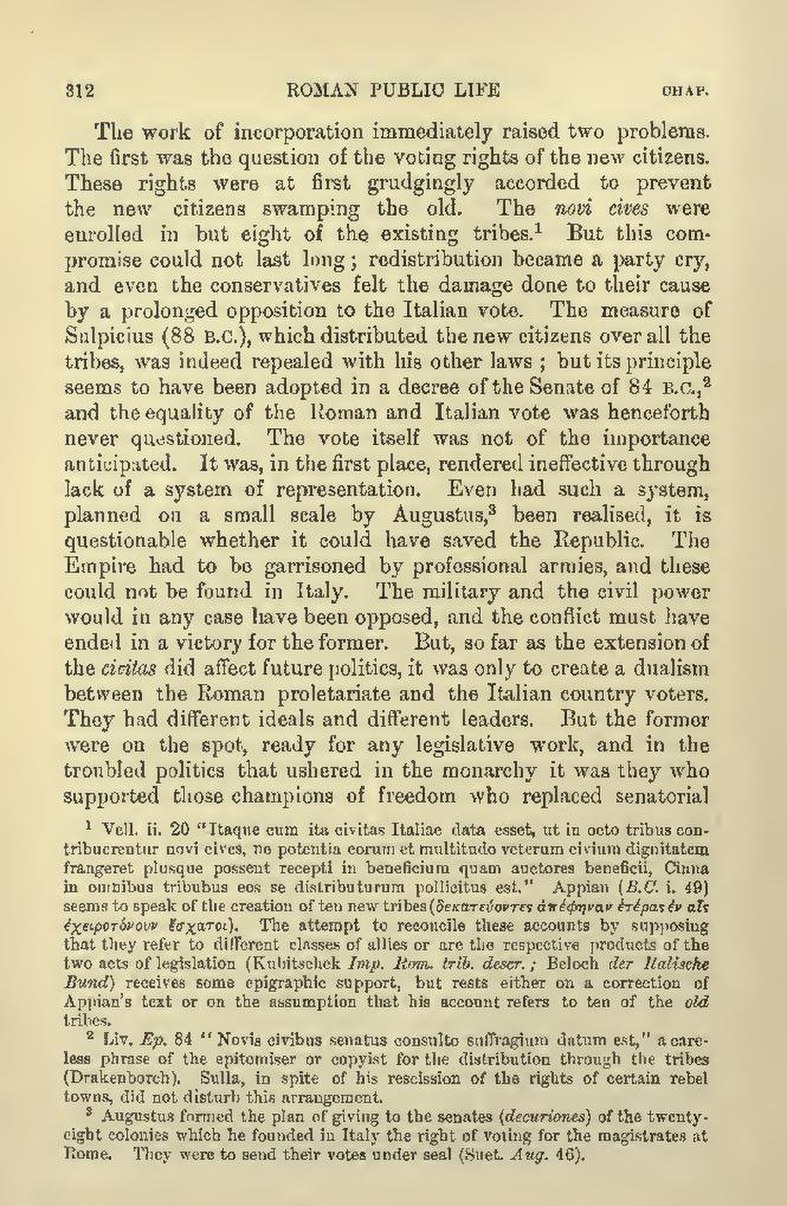The work of incorporation immediately raised two problems. The first was the question of the voting rights of the new citizens. These rights were at first grudgingly accorded to prevent the new citizens swamping the old. The novi cives were enrolled in but eight of the existing tribes.[1] But this compromise could not last long; redistribution became a party cry, and even the conservatives felt the damage done to their cause by a prolonged opposition to the Italian vote. The measure of Sulpicius (88 B.C.), which distributed the new citizens over all the tribes, was indeed repealed with his other laws; but its principle seems to have been adopted in a decree of the Senate of 84 B.C.,[2] and the equality of the Roman and Italian vote was henceforth never questioned. The vote itself was not of the importance anticipated. It was, in the first place, rendered ineffective through lack of a system of representation. Even had such a system, planned on a small scale by Augustus,[3] been realised, it is questionable whether it could have saved the Republic. The Empire had to be garrisoned by professional armies, and these could not be found in Italy. The military and the civil power would in any case have been opposed, and the conflict must have ended in a victory for the former. But, so far as the extension of the civitas did affect future politics, it was only to create a dualism between the Roman proletariate and the Italian country voters. They had different ideals and different leaders. But the former were on the spot, ready for any legislative work, and in the troubled politics that ushered in the monarchy it was they who supported those champions of freedom who replaced senatorial). The attempt to reconcile these accounts by supposing that they refer to different classes of allies or are the respective products of the two acts of legislation (Kubitschek Imp. Rom. trib. descr.; Beloch der Italische Bund) receives some epigraphic support, but rests either on a correction of Appian's text or on the assumption that his account refers to ten of the old tribes.]
- ↑ Vell. ii. 20 "Itaque cum ita civitas Italiae data esset, ut in octo tribus contribuerentur novi cives, ne potentia eorum et multitudo veterum civium dignitatem frangeret plusque possent recepti in beneficium quam auctores beneficii, Cinna in omnibus tribubus eos se distributurum pollicitus est." Appian (B.C. i. 49) seems to speak of the creation of ten new tribes ([Greek: dekateuontes apephênan heteras en hais echeirotonoun eschatoi
- ↑ Liv. Ep. 84 "Novis civibus senatus consulto suffragium datum est," a careless phrase of the epitomiser or copyist for the distribution through the tribes (Drakenborch). Sulla, in spite of his rescission of the rights of certain rebel towns, did not disturb this arrangement.
- ↑ Augustus formed the plan of giving to the senates (decuriones) of the twenty-eight colonies which he founded in Italy the right of voting for the magistrates at Rome. They were to send their votes under seal (Suet. Aug. 46).
